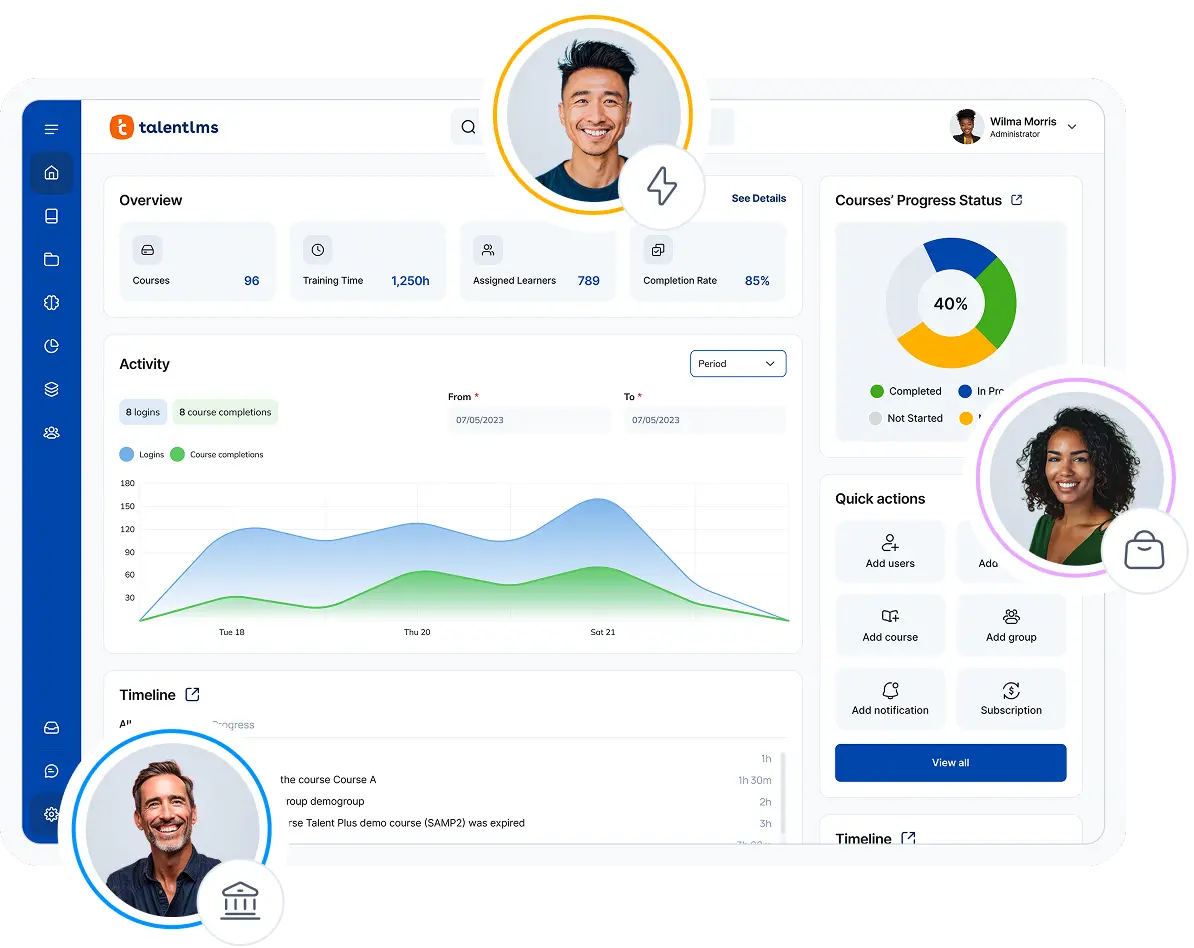Sales is a demanding role with a steep learning curve. Sales teams that lack training are more likely to fail.
When salespeople are put in front of prospects without the right skills, they can lose confidence and motivation. It hurts their morale, causing higher stress and lower job satisfaction.
If not addressed, the financial and cultural costs of poor sales training quickly compound. But with the right topics and strategy, you can avoid these pitfalls and set your team up to thrive.
Effective sales training topics to help your team
Sales training programs should focus on key topics to boost team success and make the most of your training. Knowing which sales training topics to focus on can help you create useful training programs for your team.
For a thorough sales training program, you need to think about the prospect’s journey and how your efforts fit into that.
That’s why, we’ve outlined some essential sales training topics that cover the whole journey to provide a holistic sales training approach.
1. Prospecting
Performing your due diligence goes a long way in everything you do.
Laying down the groundwork to identify prospects that fit your buyer persona is one of the first steps you need to take in the sales process. And it’s what will get your foot in the door.
A sales process must. Let’s check it out:
- Research. Research. Research. With the mountain of information out there, you can learn almost everything about companies or people you’re interested in. Then, you can focus on providing the solution that fits their needs.
- Connect through social media. Prospects are out there and they’re practically everywhere. One of the most relevant and influential platforms in business is LinkedIn. Start off by following your prospects. Interact with their content and showcase your expertise. That way, you’ll warm up to them and they’ll more likely accept your connection request.
- Track your progress. It’s important to have a well-rounded view of who you’ve reached out to, how they responded, and what your next steps are. This will help you stay on track and become more effective in your prospecting efforts.
2. Product knowledge and industry trends
A salesperson who knows their products inside and out will be far more effective at selling them.
When sellers have extensive knowledge about their products, they naturally feel more confident. They’re also able to naturally engage in questions and conversations about the product.
Say you are selling Vietnamese coffee in the States. When approaching a new café about selling your beans, you might be asked technical questions about how they’re roasted, the blend type, the growth altitude, and more.
A rep with broad product knowledge could maybe answer these questions on a surface level. And may be trumped by questions that may bring the competition into the discussion.
Meanwhile, a rep with in-depth product and industry knowledge can communicate on a much deeper level.
Some key areas sales teams should focus on include:
- Product features/benefits. Sales professionals should be able to speak confidently about features and benefits. But, presenting benefits in a way that provides value to the customer goes a long way compared to listing features.
- Competitor comparisons. They should know the strengths and weaknesses compared to your competitors. That way, they’ll be better prepared to tackle any concerns.
- Industry trends. They should know what the market and industry trends are to ensure that they can predict customer needs or be prepared to adapt in a changing environment.
Your sellers’ product and industry knowledge needs to go beyond more than memorizing a list of features. Their success also depends on how effectively they can convey the message.
3. Effective communication
Simply presenting product details isn’t enough — reps need to communicate in a way that resonates with each unique prospect.
Communicating well means changing the way you give information to different people. This way, they’re more comfortable and willing to listen to what you have to say. It’s all about being empathetic and adjusting to your audience. When done right, it helps to build rapport, address customer needs, and positively engage.
Sales reps can learn these techniques in training to communicate better:
- Active listening is the practice of engaged listening without interrupting customers. Training can teach techniques like paraphrasing what customers say to demonstrate understanding.
- Powerful questioning is all about asking thoughtful questions to dig out customer challenges and true needs. Sales training should include frameworks for different question types, like open-ended and probing questions.
- Summarizing helps sales reps validate understanding. Training should focus on summarizing customer issues and desired outcomes throughout sales conversations.
TalentLibrary – Skills that matter, courses that deliver
With TalentLibrary, you set the foundation for a strong, aligned workforce—soft skills, compliance, and workplace essentials, from day one (and beyond).
4. Analyzing customer needs
A great sales rep deeply understands their buyer’s personas, motivations, pain points, and objections.
Let’s say your Vietnamese coffee business is doing well, and you want to infiltrate the large grocery store market. In this type of market, your sales team will deal with completely different types of people (CEOs, owners, development leaders, etc.) than in the cafés. They might need to adjust their conversations from product information to cover other topics like expected ROI or even packaging materials.
So, before the coffee sales team goes in with guns blazing, they should do their due diligence and prepare. They should create user personas and customer journeys and plan for pain points and objections.
Keep in mind that people are also highly diverse, and they might prefer certain things, like communication, to follow a specific sequence. For example, Baby Boomers might prefer face-to-face conversations, while Gen Zers are happy with text or emails.
A salesperson approaching Baby Boomers with meetings will better engage them.
Some key sales training pointers on ideal customers:
- How to develop detailed buyer personas.
- How to map the customer journey and use it to identify key triggers, pain points, and questions at each stage.
- Understand customer motivations and pain points.
- Anticipate objections.
- Personalize messaging and calls to align with each persona’s specific needs and preferences.
5. Elevator pitch training
Most prospects simply tune out of generic sales pitches. In fact, 66% of buyers expect tailored solutions, not cookie-cutter pitches.
One way to capture their attention is with storytelling. Stories create an emotional connection between the sales rep and the prospect and make key messages more memorable.
Rather than just listing the benefits of your product, help your sales team tell a story about how it helped another customer.
Stories also help reps connect with prospects on a personal level. Reps can share a relatable anecdote that shows they understand their pain points. Or they tell a story that shows how the product helped a different customer in their industry.
Additionally, stories can help reps address objections indirectly. If a prospect finds the offering pricey, share how another customer felt the investment was worth it. Or, if they’re unsure about switching from their current vendor, tell a story about how one company did it and the benefits they saw.
The key is keeping stories concise, relevant, and authentic. Sales reps should practice developing and delivering short, impactful stories that humanize their pitch.
A few useful stories can help prospects see the value proposition of the offering.
6. Negotiation skills
Many sales reps dread the negotiation process or lack effective tactics. This could be due to the fact that 40% said that they didn’t have the tools, skills, or confidence to negotiate successfully.
Strong negotiation skills help sales reps drive deals forward and create win-win solutions with prospects. Training is a great place to hone your sales team’s negotiation skills.
Sales training programs should focus on building these negotiation tactics:
- Know when to negotiate. Reps should understand when to negotiate based on factors like the prospect’s budget, authority, needs, and timeline.
- Understand bargaining zones. Successful negotiators identify the target’s possible bargaining range and use it to make strategic offers. If a product costs $5,000, the rep may open at $7,500, expecting to settle around $6,000.
- Make strategic concessions. Reps shouldn’t immediately cave to prospect demands. Instead, offer thoughtful compromises that provide value without giving away too much.
- Find mutual value. The best negotiations leave both parties satisfied.
7. Building rapport
Building rapport with customers is the act of establishing trust and connection. It’s like building a long-time friendship with a new friend.
Rapport takes a long time to build, and like communication, your sales team should vary it depending on who they are dealing with.
For example, a sales rep talking with a CEO should take a more formal approach compared to speaking with an office manager. They should match the CEO’s demeanor and discuss things like high-level goals and strategy. With the office manager, they could make small talk about family or hobbies to find common ground.
Here’s a list of sales training topics for rapport:
- Mirror body language. This creates subconscious feelings of connection and similarity.
- Use the customer’s name. People love hearing their own names, and it makes them feel valued.
- Establish common ground. Look for shared interests, experiences, or backgrounds.
- Demonstrate genuine interest. Give your full attention, make eye contact, and actively listen without distractions. Ask follow-up questions to show care and understanding.
8. Sales and CRM tools
A chef’s tools help them bake more efficiently. Similarly, sales and CRM tools can help reps approach more prospects, understand customers, and ultimately close more deals. But only if they know how to use them properly.
The digital transformation has brought a wealth of new sales technologies that require training. Two key areas of sales tech training are CRM and sales enablement tools.
Customer relationship management (CRM) software equips sales teams with powerful tools like:
- Client profiles and interaction tracking
- Third-party integrations
- Lead management
- Customer data analytics, reporting, and dashboards
- Template and document management
- Company and contact management functionality
Sales enablement tools empower sales teams to sell smarter and faster with customized content, automation, and insights tailored to each deal.
Training on a good CRM, such as Pipedrive, Salesforce or Microsoft Dynamics, will help reps input accurate data, follow workflows, and run reports successfully.
Beyond the core CRM, training on sales enablement tools like Outreach or Gong can boost productivity. These tools help reps execute cadences, record pitch journals, and improve skills.
Also, for optimal customer engagement, sales reps often deploy sales prospecting tools, call center software, and email marketing platforms, tailored to their channels.
Tips for a successful sales training program
With the right sales training programs, mentors, and effort, promising sales reps can become sales experts.
It will not be a linear progression or a sudden overnight change, but it will definitely be worth it.
Keep these tips in mind when setting up and honing your sales training programs:
Segment your sales training
One of the most impactful ways to improve your sales training strategy is to segment your sales reps and tailor the training for each group. Trying to take a one-size-fits-all approach often leads to ineffective sales training that doesn’t move the needle.
The first step is thoroughly assessing each sales rep to determine their strengths, weaknesses, and development areas. Look at their sales process and numbers, talk to sales staff and their managers, and get input directly from the reps.
Once you have a clear sense of each rep’s abilities, group those with similar strengths and needs into segments. For example, you may create one training track for newer reps, another for experienced reps looking for a successful sales strategy, and a third for reps who need to learn to negotiate better to reach quota.
With your sales team segmented, you can tailor the training structure, activities, and coaching for each group.
Tips to keep in mind:
- Newer reps may need more product knowledge, training, and role-playing to practice pitches.
- Experienced reps may benefit from advanced sales methodology training and competitive simulations.
- Unmotivated reps may respond best to inspirational speakers and incentives to hit goals.
Focus on practice
Sales role-play exercises improve negotiation skills, leading to higher win rates for sellers. A study showed a 20–45% increase in win rates for those who practiced sales role-playing.
Sales reps need opportunities to practice and apply their new skills in settings that mimic real sales conversations. Practice helps bridge the “knowing-doing” gap in sales training.
Role playing common sales scenarios gives reps an opportunity to safely try out different approaches, make mistakes, and receive feedback. All the training and practice eventually culminates in a calm and natural salesperson.
During training, you can use creative scenarios to cover objections, closing techniques, discovery questions, and building rapport. And try to make the role plays as realistic as possible so that the real deal feels familiar.
Immersive sales simulations and games also create engaging experiences where reps can sharpen their skills. These simulate the challenges and emotions of selling through interactive storylines and competitive elements.
Measure results
Measure results to make sure sales training impacts your business.
Send out surveys after training to gauge participant reactions, what they learned, and how they plan to apply the training. Also, ask for their feedback about sales processes, sales strategies, and the sales training program.
Look at metrics before and after training, like deal size, conversion rates, quota attainment, etc. See if training positively impacted these KPIs and if you can attribute changes to specific training initiatives.
Tweak underperforming areas and double down on what works.
Make training ongoing
Effective sales training isn’t a one-and-done event—it requires an ongoing commitment. Repetition and incremental expansion keep skills sharp.
Schedule refresher courses quarterly or biannually to reinforce core selling skills. Also, build in new training modules to expand reps’ capabilities over time—advanced negotiation tactics, story selling, cross-selling, or something you believe will help.
Ongoing coaching makes sure that the training sticks and is put into practice. Classroom training should be supplemented with regular in-field coaching from sales managers. Things like ride-along on sales calls, shadowing pitches, and real-time feedback should be “the norm”.
How to deliver sales training to your reps
Effective sales training engages salespeople and teaches them new skills. An important aspect of this is identifying the right sales training topics for your team.
Once you’ve identified the key sales training topics, you must determine how to deliver them to your sales reps.
One of the most effective ways is through a learning management system (LMS) dedicated to sales training. An LMS like TalentLMS lets you build engaging courses in one place that you can simply share with your sales team members.
With an LMS, you’ll save countless hours of coordinating in-person training sessions. Your reps can learn on their schedule and at their own pace. And you’ll have insight into who may need extra coaching with downloadable reports on quiz scores, course completion, and more.
For example, you can upload video lessons on prospecting techniques or product demos. Your reps can study the content in their own time, and then you can assess their understanding with quizzes and tests within the LMS.
You can also use an LMS to make learning more fun and motivating through gamification. You can set up leaderboards, badges, and points to make the training more interactive and fun.
Train to thrive
Sales training is an ongoing process of continuous improvement. Like Toyota’s Kaizen philosophy, successful sales teams are always looking for ways to refine and develop their training programs.
The sales training topics we’ve covered represent core competencies for any sales team. Mastery of these skills is what separates good reps from great ones.
But the work doesn’t stop here. As your business and market change, so too must your training curriculum. Regularly evaluate your team’s strengths and weaknesses, and be willing to tweak methodologies or introduce new concepts.
The payoff will be well worth the effort — increased productivity, higher win rates, reduced turnover, and ultimately, faster business growth powered by your A-player sales crew. The journey to sales success never ends, but making training a priority puts you well down the road.
| Tags: Sales Training





